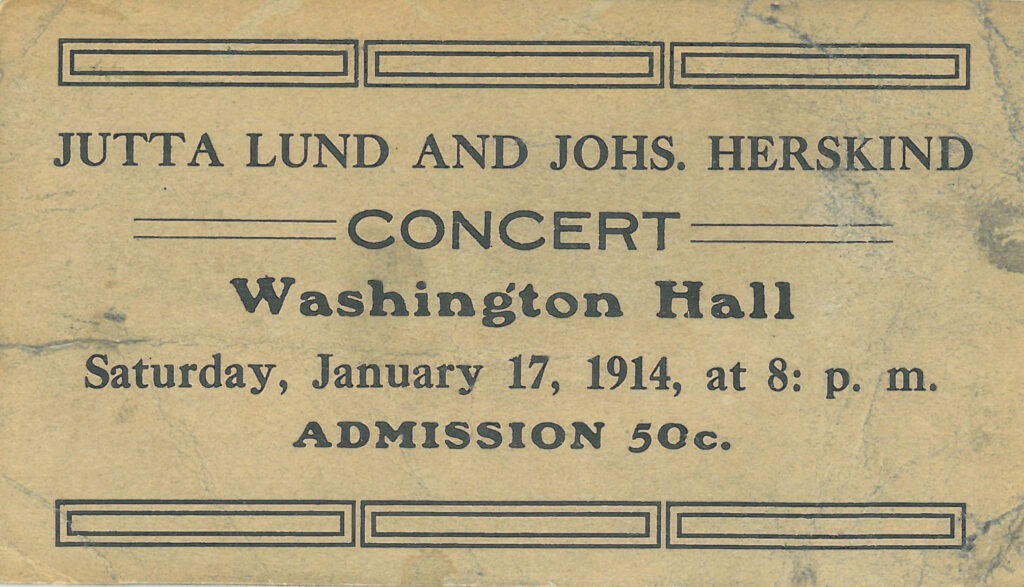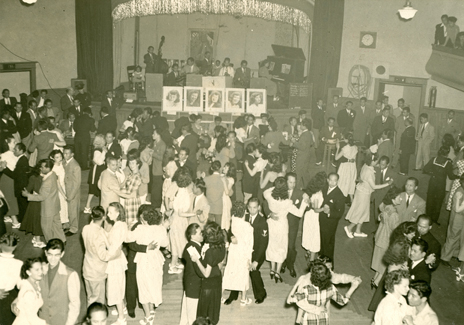
a BIT OF history
And a lasting legacy
Built in 1908 by the Danish Brotherhood, Washington Hall has been an anchor in Seattle’s Central District for over 100 years.
The building has served as a hub for social and cultural activities for a broad ethnic community. In 1973, the Sons of Haiti, an African-American Masonic Lodge, purchased the building and continued the tradition of hosting performing arts, making it the first home of On the Boards. Historic Seattle acquired Washington Hall in 2009, saving it from demolition.
The renovation of Washington Hall was a Historic Seattle community development project that engaged the collaboration of the building’s current grassroots Anchor Organizations: Black Power Unlimited (formerly Hidmo Cypher), 206 Zulu, and Voices Rising. Together, they revitalized an accessible gathering space to be enjoyed by all.

And just like that
A Hall is born
In 1908, the Danish Brotherhood in America opened the doors of Washington Hall in Seattle’s Central District. Designed by the prolific Seattle architect Victor Voorhees, the proud brick-faced building initially served as a fraternal lodge, settlement house, and center for social and cultural activities of Seattle’s Danish immigrant population. The Brotherhood also declared the building a community dance hall and performing arts venue, opening its doors to all.
From the start, the stage at Washington Hall has been in constant demand, hosting Danish and Yiddish theatrical productions in the 1910s, Filipino Youth Club dances in the 1930s, and even boxing matches in the 1950s. In the 1970s, the Hall became the official home to On the Boards, a non-profit arts organization that would stage contemporary works for the next 20 years. Local theater companies, like Nu Black Arts West Theatre, continue to stage original works at the Hall. Washington Hall is a place to incubate and be reborn.
If these walls could talk, they would sinG
Restoring the Hall
Project Overview
To save Washington Hall from possible demolition, Historic Seattle, with the help of 4Culture and many, purchased the building in 2009 and initiated an ambitious restoration plan. Historic Seattle’s plan and long-term vision for Washington Hall is to serve as a home for community arts, heritage, and cultural organizations while also continuing to serve a wide array of performance and community events through a robust rental program.
The Renovation
Historic Seattle acquired the building in June 2009. The approach retained the existing historic fabric and features, repaired them where necessary, and replaced them in-kind as needed. The restoration of Washington Hall was implemented in four phases:
Phase I
$2.5 million raised for property acquisition and stabilization.
Phase II
$840,000 raised for the urgently needed roof replacement and rebuilding of the damaged south wall.
Phase III
$5.6 million raised for seismic retrofit, elevator, sprinklers, performance, and operating space.
Phase IV
$986,000 secured to restore historic windows and main facade, and to complete interior build-out including affordable tenant offices, meeting space, and recording studio.
The $9.9 million project has been supported by city, county, and state agencies, local foundations, corporations, and individual donors, culminating in November 2015 with a $986,000 grant from King County and 4Culture’s Building For Culture program. Receiving this grant allowed the renovation work to remain on schedule, and Washington Hall reopened in June 2016.
Lasting Stewardship
Restoration included stabilization of the building through seismic upgrades, a new roof, and securing the south wall. For the first time in its history, the Hall is now fully accessible, with the addition of an elevator. Refinished floors, stage enhancements, new lighting, and a complete reworking of the back space of the building, which initially housed rooms for the newly arrived Danish immigrants in Seattle, will restore this Historic Landmark building in a way that honors its storied past.
Now fully renovated, the building’s main hall and lodge room address the need for affordable venues in Seattle, particularly for emerging and generative artists. The Hall provides nonprofit office space, meeting rooms, a recording studio, a catering kitchen, a small café, and space for interpretive displays about the Hall’s history.
The Hall is home to three anchor organizations: 206 Zulu, Black Power Unlimited (formerly Hidmo Cypher), Voices Rising; and Creative Justice.